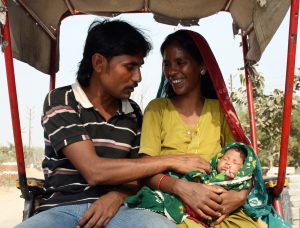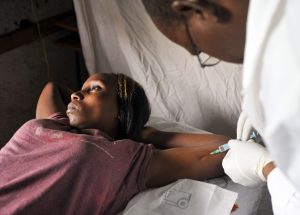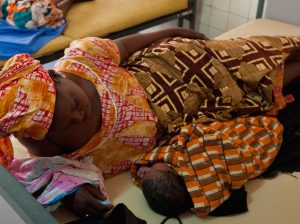The Measurement, Learning & Evaluation Project
December 1, 2016
Half of the world’s population lives in cities, and the number of impoverished people living in cities is growing exponentially. Of the many critical health services needed by the urban poor, one is often overlooked – family planning services.
Early in this decade, the Bill & Melinda Gates Foundation recognized these disparities in reproductive health services and decided to act.
“We realized that a lot of focus was on rural communities and women in villages and that the urban poor were being neglected,” says Lester Coutinho, deputy director of the Family Planning Program at the Gates Foundation. “We decided to try to solve this problem and made a large investment in four countries, focusing on urban areas.”

A couple in Uttar Pradesh, India, followed family planning messages about healthy spacing of pregnancies. (Photo ©2010 by M. Hussain/FHI 360)
The Gates Foundation funded the Urban Reproductive Health (RH) Initiative, aimed at improving the health of the urban poor in India, Kenya, Nigeria and Senegal. The foundation also invested more than $22 million in The Measurement, Learning & Evaluation (MLE) Project, the evaluation component of the Urban RH Initiative, run by UNC’s Carolina Population Center. The goal of the MLE project is to promote evidence-based decision making in the design of integrated family planning and reproductive health interventions for the Urban RH Initiative.
“The main objective of the MLE Project is to obtain rigorous findings about the initiative,” says Ilene Speizer, PhD, co-principal investigator and technical deputy director of MLE and research professor in the UNC Gillings School of Global Public Health’s Department of Maternal and Child Health.
Speizer has helped lead evaluations in the four targeted countries and demonstrated increases in the use of modern family planning in each country.
“Our second goal is to build the capacity of these programs to use data to inform policies and programs,” Speizer says. “We also want to share lessons on family planning across the partnership and throughout the world.”
Coutinho says the investment was worthwhile, as the data show dramatic results, particularly with the “poorest of the poor,” the people whom the project wanted to help.

A woman in Nairobi, Kenya undergoes a procedure to insert an implant that provides birth control for up to five years. (Photo ©2012 by Tobin Jones, Tupange)
“We knew that if we wanted to help shape the thinking of the broader community around integrated family planning and reproductive health interventions,” Coutinho explains, “it wouldn’t be enough to say, ‘We know this program works because our partners have told us so.’ If we wanted to convince the rest of the world that these programs worked, we would need data to prove it.”
The most fascinating aspect of the findings, aside from proving that the programs were successful, was that the data pinpointed the program elements having the most impact in sub-populations of the community.
“We could explain which segments of the population were better suited to the different solutions being tested,” he says.
That was true in Senegal, where the program initiated 19 activities. After evaluating midterm data, the researchers streamlined the program to six activities, including working with religious leaders to encourage family planning use.
“In our initial results, we found that working with religious leaders had no effect on women’s attitudes about and use of family planning,” says Speizer. “Program leaders were considering dropping the religious leader component of the program, but we said, ‘Let’s look at men.’ We found that religious leaders were clearly important influencers on men, and so that component of the program remained.”
Similarly, the Nigerian Urban Reproductive Health Initiative used the MLE four-year longitudinal study data to create and refine its multifocal activities.
Dr. Mojisola Odeku, project director, says that using two levels of data, which offer both population traits and individual observations, allowed her project to build programs that resulted in a higher demand for family planning services. They also were able to strengthen supply-side activities to improve the quality of service.

A mother enjoys quiet time with her newborn after a successful delivery. (Contributed photo)
“This project was created so that baseline data informed program design, midterm data could be used to modify the programs and scale up programs in new cities, and end-line data are being used in our country and other countries, as we expand,” says Odeku.
Based on MLE results, the Gates Foundation is expanding activities in other urban areas within the four program countries – and in additional countries – through a new effort called The Challenge Initiative.
Speizer says that she and her research team have made important contributions to the body of knowledge about reproductive health services for the urban poor. MLE’s data is having an impact on how family planning can be adopted postpartum, the role played by gender relations on family planning use, the barriers put in place by health care providers to prevent some women from obtaining family planning services, access to reproductive health services by adolescent men and women, and other areas of reproductive health and maternal and child health.
“An important message from these data is that the lives of women can be improved if they have access to accurate information and their concerns are addressed through different models of intervention,” says Odeku. “Every city in which we’ve worked has its own unique qualities, and the data revealed those nuances to us. The data helped us to avoid ‘one-size-fits-all’ solutions and allowed us, based on the findings, to adapt to each specific environment.”
– Michele Lynn

Dr. Ilene Speizer
Ilene Speizer, PhD
In September 2016, Speizer was selected as one of six scholars who will spend up to one full academic year at RTI International, developing strategic research projects. Speizer works with Wendee Wechsberg, PhD, director of the RTI Global Gender Center, to pursue a National Institutes of Health grant for health interventions for young women who engage in transactional sex in Pretoria, South Africa. RTI began hosting its University Scholars program in the 2014-2015 academic year.
Carolina Public Health is a publication of the University of North Carolina at Chapel Hill Gillings School of Global Public Health. To view previous issues, please visit sph.unc.edu/cph.
